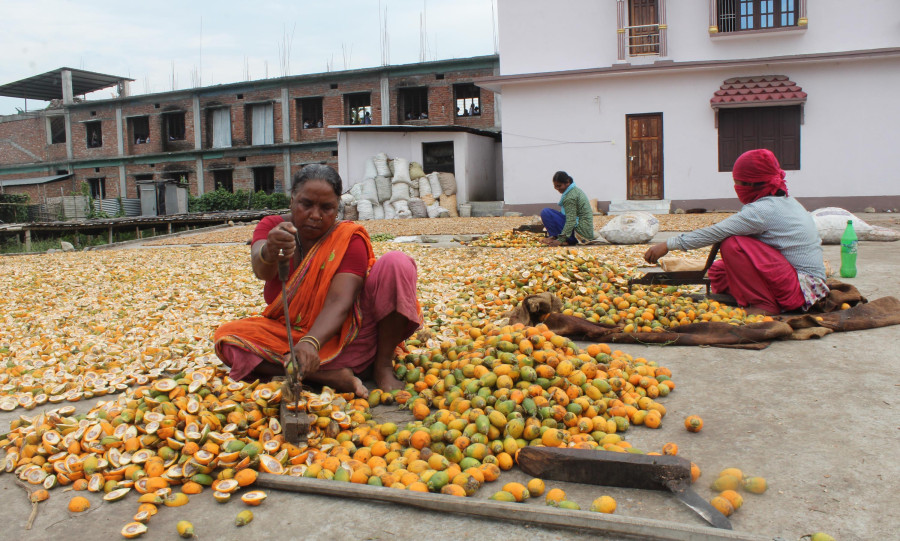Money
Betel nut industry in Jhapa collapses after India bans imports
Buoyed by the prospects, the government had even declared Jhapa a betel nut zone.
Arjun Rajbanshi
Narayan Prasad Rijal of Budhabare, Jhapa set up a betel nut processing plant a decade ago when business was booming due to insatiable demand from India.
But in 2017, sales collapsed after the Indian government banned imports of the product from Nepal, and the entrepreneur farmer is wringing his hands in despair.
Rijal used to buy betel nuts worth Rs5 million annually from local farmers which he processed in his plant established on 10 katthas of land. His factory has shut down. Like Rijal, more than 25,000 farmers and traders don't know what they are going to do.
India banned betel nuts from Nepal on July 10, 2013 following complaints of widespread illegal trade. Nepali traders were exporting more betel nuts to India than could possibly have been produced in Nepal. This only meant that imports from third countries were being re-exported to the southern neighbour to take advantage of its low customs duty.
A notification issued by India’s Director General of Foreign Trade said that betel nut imports were permitted only through Mangalore port, prohibiting the use of Jogbani and Panitanki land customs on the Nepal-India border as entry points.
The Indian government took the step following allegations of large scale smuggling of betel nuts. The ban has hurt genuine farmers in the eastern region who produce and trade betel nuts.
Buoyed by the prospects during the industry's heyday, the government had even declared Jhapa a betel nut zone, but trade has been dead for the last three years. Traders said that shipments to India had stopped, and unsold stocks were rotting in their warehouses.
“We used to buy paddy after leasing our betel nut fields to traders,” said farmer Maiya Devi Gajurel of Buddha Shanti Rural Municipality. “Traders don't come to buy betel nuts nowadays,” she said. Gajurel used to grow betel nuts on 2 bighas of land.
A majority of farmers in Budhabare, Sanishchare, Arjundhara, Shantinagar and Dhaijan have large betel nut fields.
Jhapa district was declared a betel nut zone two years ago under the Prime Minister Agriculture Modernisation Project. The government has even allocated funds to promote its production and processing.
According to Rabindra Subedi, senior officer for the project, Rs11.6 million has already been disbursed to promote betel nut farming in different parts of the district in the current fiscal year.
“Trade has come to a halt, but the irony is that the government is asking us to increase production,” said farmer Umanath Gautam. “We are in a dilemma.”
The project is being implemented over 788 hectares in 20 wards of three local units in the district. The project implementation units claimed that the zone project would positively impact farmers growing the nut on 2,790 hectares.
Fifteen years ago, the farmers were selling dried betel nuts for Rs320 per kg, and four years ago, raw nuts were sold at Rs75 per kg. But that has changed in the past two years, as farmers see no traders buying their harvests.
“Every year, prices are plummeting; and sales have gone down in the past three years,” said Hari Kishan Gupta, a local trader. “Because of falling prices, farmers are not able to break even.”
According to Gupta, betel nuts hardly fetch Rs270 per kg nowadays. He said he had 6,000 kg of unsold betel nuts in his warehouse.




 9.83°C Kathmandu
9.83°C Kathmandu















